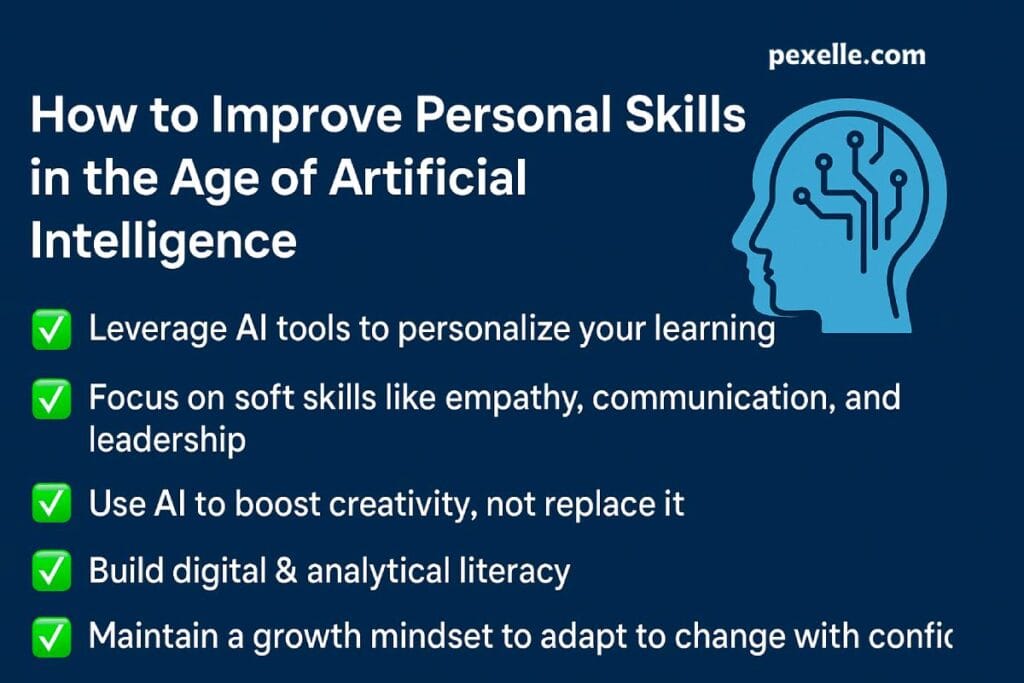How to Improve Personal Skills in the Age of Artificial Intelligence

As artificial intelligence (AI) becomes increasingly integrated into our daily lives and workplaces, many people fear that human skills will become obsolete. However, this perspective overlooks a critical opportunity: the AI era offers unique ways to enhance personal skills rather than diminish them. Rather than competing with machines, individuals can focus on cultivating human-centric strengths that AI cannot replicate—creativity, emotional intelligence, adaptability, and critical thinking.
Embrace Lifelong Learning with AI Tools
AI can be a powerful ally in personal development. Platforms powered by machine learning, such as personalized learning apps and AI-driven tutors, provide customized educational experiences based on your learning style and pace. Whether you’re learning a new language, mastering coding, or improving your writing, AI can guide you through real-time feedback, suggestions, and adaptive challenges. By embracing these tools, individuals can accelerate their learning curves and stay ahead in a fast-changing world.
Moreover, AI can help identify your strengths and weaknesses more objectively than traditional methods. For instance, AI-driven analytics in productivity apps can show you when you’re most focused or how you manage time, allowing you to adjust your habits for better results. Using AI as a feedback mechanism encourages data-informed self-improvement strategies.
Focus on Unautomatable Skills
While AI excels at processing data and automating routine tasks, it still lacks the subtlety of human emotions and ethics. Skills like empathy, storytelling, active listening, leadership, and collaboration are irreplaceable in human interaction and essential in personal and professional growth. By intentionally developing these “soft skills,” individuals remain valuable in AI-enhanced environments.
You can improve emotional intelligence by practicing mindfulness, engaging in diverse social settings, and seeking constructive feedback. Courses in negotiation, interpersonal communication, or ethical decision-making also provide practical ways to strengthen these human-first capabilities. These are areas where human intuition and nuance outperform any algorithm.
Use AI to Strengthen Creative Thinking
AI is increasingly being used as a creative partner in fields like art, music, design, and content creation. Tools like ChatGPT, Midjourney, or DALL·E can help brainstorm ideas, visualize concepts, and experiment with possibilities. However, creativity remains a uniquely human skill. AI can generate patterns, but it cannot intuit context or emotion the way a human can.
To enhance your creative thinking, use AI to overcome creative blocks or as a source of inspiration—but not a replacement for original thought. Challenge yourself to go beyond AI’s suggestions. Think critically about what makes your idea stand out and how to connect emotionally with your audience or user. In this sense, AI becomes a sparring partner rather than a substitute.
Strengthen Digital and Analytical Literacy
In the age of AI, understanding how AI works is itself a crucial skill. Basic literacy in data analysis, programming logic, or machine learning concepts can make you more agile in adapting to new technologies. Even non-technical professionals benefit from understanding AI’s limitations, biases, and decision-making processes.
Online courses, tutorials, and simulations can help build this literacy. Whether you’re in business, healthcare, education, or the arts, developing a foundational understanding of how AI functions can help you interact more confidently and ethically with intelligent systems, giving you a distinct edge in any field.
Develop a Growth-Oriented Mindset
The most important skill in the AI era is perhaps the mindset of adaptability. Jobs, industries, and even social structures are evolving rapidly. A fixed mindset will lead to stagnation and fear, while a growth mindset enables curiosity, experimentation, and resilience. AI can support this mindset by offering continual feedback, personalized challenges, and simulated environments where failure is safe and instructive.
Practice setting micro-goals, experimenting with new AI tools, and reflecting on failures not as setbacks but as learning milestones. Surround yourself with peers who are also embracing change and cultivating cross-disciplinary skills.
Conclusion
Artificial intelligence is not here to replace us—it’s here to augment our capabilities. The future belongs to those who can combine technical fluency with human depth. By strategically using AI as a tool, focusing on human-centric skills, and committing to lifelong learning, we can not only remain relevant but thrive in an increasingly automated world. The key is to evolve with AI, not against it.
Source : Medium.com




